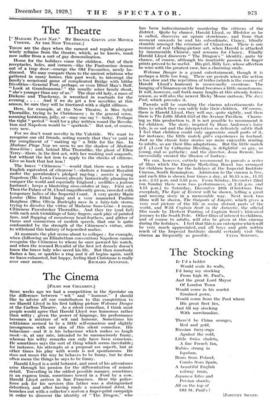The Cinema
[FILMS FOR CHILDREN.]
SOME weeks ago we had a competition in the Spectator on the difference between " wit " and " humour." I should like to advise all our contributors to this competition to see Harold Lloyd in his first talking picture Welcome Dangey at the Carlton Theatre. As a silent comedian, I think most people would agree that Harold Lloyd was humorous rather than witty ; given the power of language, his performance becomes a mixture of wit and humour. Sometimes his witticisms seemed to be a little self-conscious and slightly incongruous with our idea of this silent comedian. His behaviour—and it is his behaviour which makes us laugh most—is, at any rate, intended to be unconsciously funny, whereas his witty remarks can only have been conscious. He sometimes says the sort of thing which seems inevitable ; for instance, his attempts at a proposal are superb, but at other times his play with words is not spontaneous. He does not mean the way he behaves to be funny, but he does often mean the things he says to be funny.
Harold Lloyd is a mild botanist, and most of his adventures arise through his passion for the -differentiation of minute detail. Travelling in the oddest possible manner, sometimes in an express train; sometimes towed in a Ford by a cow, Harold Lloyd arrives in San Francisco. Here the police- force ask for his services (his father was a distinguished detective), and after having made a sensational debut, he launches out with a collector's zeal on a finger-print campaign in order- to discover the identity of " The Dragon," who
has been indiscriminately murdering the citizens of the district. Quite by chance, Harold Lloyd, or Bledsloe as he is called, discovers an opium storehouse, and from that moment onwards he and his subordinate, Clancy, blindly stumble amongst the criminals of Chinatown. There is one moment of real talking-picture art, when Harold is attacked by innumerable Chinese, and screams for Clancy. Finally Harold Lloyd discovers " The Dragon's " identity, quite by chance, of course, although his insatiable passion for finger prints proved to be useful. His girl, Billy Lee, whose affection he wins with the greatest ease, has a charming smile.
Welcome Danger is a grand entertainment, though it is perhaps a little too long. There are periods when the action is too slow and the repetition of trifles (which is the essence of Harold Lloyd's humour) is occasionally overdone. The banging of Chinamen on the head becomes a little monotonous. It will, however, call forth many laughs at this already festive season, as will also the newest Micky Mouse cartoon, already Jazz. Fool, which precedes it.
Parents will be searching the cinema advertisements for films to which they can safely take their children. Of course, there is Harold Lloyd, they will say, quite rightly, and then there is The Little Match Girl at the Avenue Pavilion. Charm- ing as this production is, it is not possible to recommend it for children. The story, inspired by Hans Andersen's fairy tale, is so sad and the interpretation so delicately subtle that I feel that children could only appreciate small parts of it, for instance, the little match girl's experiences in toyland. Just as the classic fairy stories are more enjoyable reading to adults, so are their film adaptations. But the little match gi:1, 111yed by Catharine Hessling, is delightful—so gay, so young, and so pathetic ; and the director, Jean Renoir, has successfully created the illusion of fantasy.
We can, however, entirely recommend to parents a series of films which the Empire Marketing Board has arranged for children home for the holidays at the Imperial Institute Cinema, South Kensington. Admission to the cinema is free, and each film is shown four times a day, at 10.15 a.m., 11.35 a.m., 2.15 p.m. and 3.35 p.m. From Sunday, December 22nd (on Sunday there were two performances, at 2.45 p.m. and 4.15 p.m.) to Saturday, December 28th (Christmas Day excepted), The Epic of Everest will be shown, telling a great and moving story in a memorable way. Next week two films will be shown, The Outposts of Empire, which gives a very real picture of the life in many distant parts of the world, and With Captain Scott in the Antarctic, the official film made by Herbert Ponting of Captain Scott's historical journey to the South Pole. Other films of interest to children, and of course to adults, will also be given at this cinema during the holidays. I feel that this is an enterprise which will be very much appreciated, and all boys and girls within reach of the Imperial Institute should certainly visit this cinema as frequently as possible. CELIA SIMPSON.
































 Previous page
Previous page